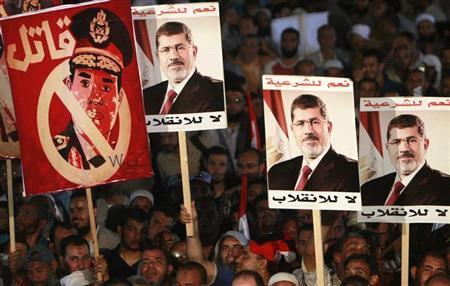Ammon News - DOHA (Reuters) - Egypt must release jailed Muslim Brotherhood leaders to help resolve a political crisis following the overthrow of Islamist President Mohamed Mursi, Qatar's foreign minister said on Wednesday.
Khaled al-Attiya, who has been trying to mediate an end to the political turmoil in Egypt, returned on Wednesday after several days in Cairo and complained he had not been able to meet all the parties he had been promised to see.
Mursi, Egypt's first freely elected president, was ousted on July 3, following large protests. Mursi is being detained at an undisclosed location and thousands of his supporters are camped out at two protest sites in Cairo.
"My wish for the brothers in Egypt is to release the political prisoners as soon as possible because they are the key to unlocking this crisis," Attiya told Qatar-based Al Jazeera television in an interview.
"Without a serious dialogue with all the parties, and most importantly with the political prisoners because they are the main element in this crisis, I believe things will be difficult."
Qatar had been a main supporter of Egypt under Brotherhood rule, giving the Arab country $7 billion in aid before Mursi was ousted.
Attiya said he had met jailed Brotherhood deputy leader Khairat El-Shater for an hour and a half. He also met interim Vice President Mohammed ElBaradei but was not able to see Mursi or army chief General Abdel Fattah al-Sisi.
He said there had been an agreement that he would be able to meet all parties. "But our luck allowed us only to meet with engineer Khairat El-Shater during this visit," he said.
U.S. Deputy Secretary of State William Burns and European Union envoy Bernardino Leon met Shater, who is in prison on charges of inciting violence after Mursi's downfall, on Monday.
They tried to persuade him to recognize that there was no realistic prospect of Mursi being reinstated and to accept a political compromise. A Brotherhood spokesman said Shater had insisted they should be talking to Mursi and the only solution was the "reversal of the coup".
Mursi took power in June 2012, 16 months after the overthrow of U.S.-backed strongman Hosni Mubarak, who had ruled for nearly 30 years.
Fears he was trying to establish an Islamist autocracy, coupled with a failure to ease economic hardship afflicting most of Egypt's 84 million people, led to mass street demonstrations, triggering the army move.
Almost 300 people have been killed since the overthrow, including 80 shot dead by security forces on July 27.
